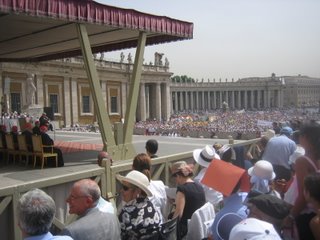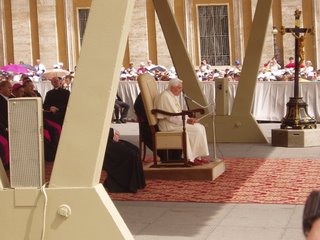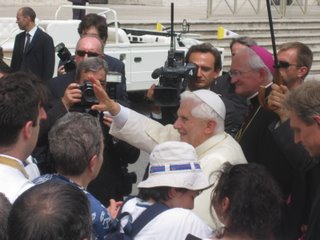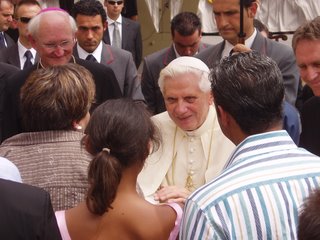Trent to Rome--Day 8
 Tuesday, June 28, 2006
Tuesday, June 28, 2006Description
This was a really big day today. After breakfast we bussed on over to the Vatican and were escorted up the stairs of St. Peter’s and to sit on the same platform as Pope Benedict XVI. This is what is means to have an “audience” with the Pope; to be among the two or three hundred people, for some reason or another, are allowed to be on the platform with the Pope. I imagine this is what distinguishes an “audience” with a “private audience” with the Pope. On my left are brides and grooms who want their marriages blessed. There are seminarians from Spain, nuns from Latin America…groups of pilgrims who have arrived in the eternal city. We arrive over an hour early and watch the throngs assemble in the plaza. There’s a celebrative feeling in the air. The time passes quickly as we talk among ourselves with anticipation. A brass band plays Italian song, among them I hear “O Solo Mia.” Names of special guests are read in their appropriate language and a welcome given. “Bakke Graduate School” is listed among the guests from English speaking nations. The MC (I don’t know what else to call him) also mentioned that “the Holy Father will impart his apostolic blessing on any religious relics, will bless families at home—especially the sick and children.” Soon there is a buzz that someone can see the Popemobile and sure enough the Pope drives up the ramp to the platform and takes his front and center seat. We have begun. A youth choir sings the Hallelujah Chorus. The text the Pope will speak from today is from Acts 15—the Jerusalem Council. He delivers brief homilies in six different languages…in this order: English, German, Spanish, Portuguese, Polish and Italian. It is quite impressive. He speaks six languages as well as Hebrew and Latin. Below is the text of his message.
 Dear Brothers and Sisters,
Dear Brothers and Sisters,Beside the figure of James the Greater, son of Zebedee, of whom we spoke last Wednesday, another James appears in the Gospels, known as "the Lesser". He is also included in the list of the Twelve Apostles personally chosen by Jesus and is always specified as "the son of Alphaeus" (Mt 10: 3; Mk 3: 18; Lk 5; Acts 1: 13). He has often been identified with another James, called "the Younger" (cf. Mk 15: 40), the son of a Mary (cf. ibid.), possibly "Mary the wife of Clopas", who stood, according to the Fourth Gospel, at the foot of the Cross with the Mother of Jesus (cf. Jn 19: 25).
He also came from Nazareth and was probably related to Jesus (cf. Mt 13: 55; Mk 6: 3); according to Semitic custom he is called "brother" (Mk 6: 3; Gal 1: 19).
The book of the Acts of the Apostles emphasizes the prominent role that this latter James played in the Church of Jerusalem. At the Apostolic Council celebrated there after the death of James the Greater he declared, together with the others, that pagans could be received into the Church without first submitting to circumcision (cf. Acts 15: 13). St Paul, who attributes a specific appearance of the Risen One to James (cf. I Cor 15: 7), even named James before Cephas-Peter on the occasion of his visit to Jerusalem, describing him as a "pillar" of that Church on a par with Peter (cf. Gal 2: 9).
Subsequently, Judeo-Christians considered him their main reference point. The Letter that bears the name of James is also attributed to him and is included in the New Testament canon. In it, he is not presented as a "brother of the Lord" but as a "servant of God and of the Lord Jesus Christ" (Jas 1: 1).
Among experts, the question of the identity of these two figures with the same name, James son of Alphaeus and James "the brother of the Lord", is disputed. With reference to the period of Jesus' earthly life, the Gospel traditions have not kept for us any account of either one of them.
The Acts of the Apostles, on the other hand, reveal that a "James" played a very important role in the early Church, as we have already mentioned, after the Resurrection of Jesus (cf. Acts 12: 17; 15: 13-21; 21: 18).
His most important act was his intervention in the matter of the difficult relations between the Christians of Jewish origin and those of pagan origin: in this matter, together with Peter, he contributed to overcoming, or rather, to integrating the original Jewish dimension of Christianity with the need not to impose upon converted pagans the obligation to submit to all the norms of the Law of Moses. The Book of Acts has preserved for us the solution of compromise proposed precisely by James and accepted by all the Apostles present, according to which pagans who believed in Jesus Christ were to be asked only to abstain from the idolatrous practice of eating the meat of animals offered in sacrifice to the gods, and from "impropriety", a term which probably alluded to irregular matrimonial unions. In practice, it was a question of adhering to only a few prohibitions of Mosaic Law held to be very important.
Thus, two important and complementary results were obtained, both of which are still valid today: on the one hand, the inseparable relationship that binds Christianity to the Jewish religion, as to a perennially alive and effective matrix, was recognized; and on the other, Christians of pagan origin were permitted to keep their own sociological identity which they would have lost had they been forced to observe the so-called "ceremonial precepts" of Moses.
Henceforth, these precepts were no longer to be considered binding for converted pagans. In essence, this gave rise to a practice of reciprocal esteem and respect which, despite subsequent regrettable misunderstandings, aimed by its nature to safeguard what was characteristic of each one of the two parties.
The oldest information on the death of this James is given to us by the Jewish historian Flavius Josephus. In his Jewish Antiquities (20, 201ff.), written in Rome towards the end of the first century, he says that the death of James was decided with an illegal initiative by the High Priest Ananus, a son of the Ananias attested to in the Gospels; in the year 62, he profited from the gap between the deposition of one Roman Procurator (Festus) and the arrival of his successor (Albinus), to hand him over for stoning.
As well as the apocryphal Proto-Gospel of James, which exalts the holiness and virginity of Mary, Mother of Jesus, the Letter that bears his name is particularly associated with the name of this James. In the canon of the New Testament, it occupies the first place among the so-called "Catholic Letters", that is, those that were not addressed to any single particular Church - such as Rome, Ephesus, etc. - but to many Churches.
It is quite an important writing which heavily insists on the need not to reduce our faith to a purely verbal or abstract declaration, but to express it in practice in good works. Among other things, he invites us to be constant in trials, joyfully accepted, and to pray with trust to obtain from God the gift of wisdom, thanks to which we succeed in understanding that the true values of life are not to be found in transient riches but rather in the ability to share our possessions with the poor and the needy (cf. Jas 1: 27).
Thus, St James' Letter shows us a very concrete and practical Christianity. Faith must be fulfilled in life, above all, in love of neighbor and especially in dedication to the poor. It is against this background that the famous sentence must be read: "As the body apart from the spirit is dead, so faith apart from works is dead" (Jas 2: 26).
At times, this declaration by St James has been considered as opposed to the affirmations of Paul, who claims that we are justified by God not by virtue of our actions but through our faith (cf. Gal 2: 16; Rom 3: 28). However, if the two apparently contradictory sentences with their different perspectives are correctly interpreted, they actually complete each other.
St Paul is opposed to the pride of man who thinks he does not need the love of God that precedes us; he is opposed to the pride of self-justification without grace, simply given and undeserved.
St James, instead, talks about works as the normal fruit of faith: "Every sound tree bears good fruit, but the bad tree bears evil fruit", the Lord says (Mt 7: 17). And St James repeats it and says it to us.
Lastly, the Letter of James urges us to abandon ourselves in the hands of God in all that we do: "If the Lord wills" (Jas 4: 15). Thus, he teaches us not to presume to plan our lives autonomously and with self interest, but to make room for the inscrutable will of God, who knows what is truly good for us.
In this way, St James remains an ever up-to-date teacher of life for each one of us.
To special groups
I am pleased to greet the English-speaking pilgrims present at this Audience, particularly those from the Philippines and the United States of America. On this eve of the Solemnity of the Sts Peter and Paul, I pray that all of you may be filled with the same zeal for Christ that inspired the two Holy Apostles. May God bless you during your stay in the Eternal City.
As usual, my thoughts go to the young people, the sick and the newly-weds. We have now entered summer, the time of holidays and rest. Dear young people, make the most of them for useful social and religious experiences; and you, dear newly-weds, to deepen your mission in the Church and in society. To you, dear sick people, also in this summer period, may you not be deprived of your relatives' closeness.
 After the service the Pope makes his way around to personally greet those who are on the south side. He meets Ray Bakke and Robert Calvert to whom he says, “I pray God’s blessing on your movement and hope you have much encouragement.” Many in our group are in the front row and personally shake the Pope’s hand. We look for something he can bless and pass to Sarah Strand (Campus Crusade in Florence) a small, pocket KJV New Testament. The most amazing thing happened—when we got it back it was in the translation of The Message and included the Apocrypha! Amazing!
After the service the Pope makes his way around to personally greet those who are on the south side. He meets Ray Bakke and Robert Calvert to whom he says, “I pray God’s blessing on your movement and hope you have much encouragement.” Many in our group are in the front row and personally shake the Pope’s hand. We look for something he can bless and pass to Sarah Strand (Campus Crusade in Florence) a small, pocket KJV New Testament. The most amazing thing happened—when we got it back it was in the translation of The Message and included the Apocrypha! Amazing!
At lunch I ate with Robert Calvert to learn more about PLACE—his ministry to cities in Europe.
After lunch we see ancient Rome. It is hot today…perhaps a hundred degrees and we’re all sweating like the desert fathers. We start at the coliseum and for the next four hours we see all that is standing of ancient Rome. We have an excellent tour guide—Alexander, a Brit who teaches ancient history at Loyola. He really knows his stuff!
We bus over to Sant’Egidio and stop for a little pizza with John and Nancy and Robert and Margaret Fomer—a delightful couple whom we’ve gotten to know on this trip. Then we go off to the Community of Sant’Egidio. The Community of Sant'Egidio is a Christian community that is officially recognized by the Catholic Church as a "Church public lay association". The Community was founded in Rome in 1968 by a group of Roman high school students led by Andrea Riccardi. It is named after the Roman Church of Sant'Egidio (Italian for Saint Giles) in Trastevere, its first permanent meeting place. Since 1968, the community has gathered each night to pray and read from the Bible, reflecting on the Gospel, eventually spreading throughout the world with a mission of helping those in need. Their activities include setting up refuges for the old, hospices for AIDS patients. They also engage in short-term relief efforts around the world. We are told that there are now 60,000 members working in 70 countries to spread the message. Its main activities are:
· Prayer--centered around a reading of the Bible
· Spreading the Gospel to help people who are looking for a sense to their life.
· Service to the poor, which is free and voluntary
· Commitment to ecumenism—friendship, prayer and cooperation between all Christians of the world
· Dialogue with members of other religions and non-believers.
We join in the evening service, with a couple hundred others. The homily is on the widow of Zarapheth—who though poor, had something still to give. We follow the message through headsets. We sing, following the Italian words in thin, blue song books. It’s a beautiful service and a fitting ending of a great day. We finish this long day at the Lamb’s room. This will be our last night together since tomorrow Liz and I will be driving up to the Cinqueterre for three days of vacation on the coast, in a little town called Monterosso.
Analysis
Where do I begin? Today I have been within arm’s reach of the person who is the spiritual leader to over a billion people. We’ve also prayed with a simple, non-ostentatious group of lay people that have gathered every night for worship and prayer for nearly fifty years. Sandwiched in between these two contrasting expressions of spirituality was the grandeur that was Rome. Both of the homilies we heard today were simple messages on Christian living. Pope Benedict mentioned our need to minister to the poor. The lay-speaker talked about the poor having something to give to others. It is when the poor give that they experience the truth that it is better to give than to receive.
I thought Pope Benedict’s message was powerful. His message on faith was as sound as anything I’ve heard coming from any pulpit. He says, “At times, this declaration by St James has been considered as opposed to the affirmations of Paul, who claims that we are justified by God not by virtue of our actions but through our faith (cf. Gal 2: 16; Rom 3: 28). However, if the two apparently contradictory sentences with their different perspectives are correctly interpreted, they actually complete each other. St Paul is opposed to the pride of man who thinks he does not need the love of God that precedes us; he is opposed to the pride of self-justification without grace, simply given and undeserved.” Did you see that? How different from the conclusions of the Council of Trent that stated in Canon 9: "If any one saith, that by faith alone the impious is justified; in such wise as to mean, that nothing else is required to co-operate in order to the obtaining the grace of Justification, and that it is not in any way necessary, that he be prepared and disposed by the movement of his own will; let him be anathema."
I’m also struck how similar the Community of Sant’Egidio is to the Focolare Movement—both started by young lay people, outside the traditional structures of church but empowered and blessed by those in power who give some of this power away. Both of these are huge, influential movements that are making a difference in the world.
Application
I’m thinking a lot these days about spiritual movements. It is amazing to me that both Focolare and Sant’Egidio were started by young people with a vision of living life differently and it struck such a chord in those around them that others that they too want to be a part. Real movements create their own momentum. You don’t have to push. You don’t even have to pull. You do have to give voice, however to what others are experiencing and others want to see. In the seminal book on movements, The True Believer, Eric Hoffer wrote: “Those who would transform a nation or the world cannot do so by breeding and captaining discontent or by demonstrating the reasonableness and desirability of the intended changes or by coercing people into a new way of life. They must know how to kindle and fan an extravagant hope. It matters not whether it be hope of a heavenly kingdom, of heaven on earth, of plunder and untold riches, of fabulous achievement or world dominion. If the Communists win Europe and a large part of the world, it will not be because they know how to stir up discontent or how to infect people with hatred, but because they know how to preach hope” (p. 9)
Young leaders need to be empowered when what they are leading is of God. The Catholic Church seems to grasp this. They, themselves might not be hitting it out of the park (it’s hard for institutions to change) but these nimble lay organizations can make changes and adjust to the times. Who can I empower? Are there people I can bless?


1 Comments:
Hey, Eric. I'm not sure whether you would remember me or not. I used to work with Campus Ventures in Wyoming. Have been in Siberia with CCC for three years, and will be making a transition to Regent College soon...
enough of the recap: just wanted to thank you for your post about your visit to the pope. I read it a day after reading through the book of James, and the timing was quite nice, I must say.
Blessings to you in your ministry.
Post a Comment
<< Home